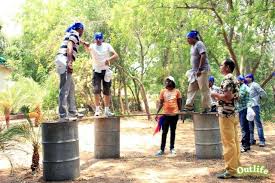Training Course on Outdoor and Experiential Learning Leadership
Training Course on Outdoor and Experiential Learning Leadership is designed to cultivate experiential learning leaders capable of designing and leading transformative outdoor programs that impact education, corporate development, youth empowerment, and community engagement.

Course Overview
Training Course on Outdoor and Experiential Learning Leadership
Introduction
In today’s fast-paced and digitally saturated world, outdoor and experiential learning stands out as a powerful leadership development tool that promotes real-world problem-solving, self-awareness, team building, and sustainable thinking. Training Course on Outdoor and Experiential Learning Leadership is designed to cultivate experiential learning leaders capable of designing and leading transformative outdoor programs that impact education, corporate development, youth empowerment, and community engagement. Grounded in evidence-based adventure education, this program will equip participants with the practical skills and theoretical knowledge needed to implement dynamic learning experiences in natural and immersive environments.
The training integrates the best practices of experiential education, environmental stewardship, risk management, leadership psychology, and group facilitation. Participants will explore innovative outdoor learning strategies that foster emotional intelligence, resilience, inclusivity, and collaborative leadership. By completing this course, learners will emerge as confident facilitators, strategic thinkers, and ethical leaders capable of applying outdoor learning frameworks in diverse settings, including schools, camps, nonprofits, and corporate training initiatives.
Objectives
- Define core principles of outdoor and experiential learning.
- Understand transformational leadership through real-world experiences.
- Master facilitation techniques for diverse outdoor environments.
- Apply risk management strategies in field settings.
- Design inclusive outdoor learning curriculums.
- Evaluate outcomes using experiential assessment tools.
- Enhance emotional intelligence in team and solo activities.
- Utilize nature-based interventions for mental well-being.
- Foster group dynamics and communication through adventure activities.
- Develop eco-leadership and sustainability competencies.
- Incorporate experiential reflection models in practice.
- Use digital storytelling and reflection tools in debriefing.
- Build capacity for trauma-informed leadership in outdoor settings.
Target Audiences
- Educators and Curriculum Designers
- Outdoor Adventure Program Leaders
- Youth Development Coordinators
- Corporate Training Managers
- Nonprofit and NGO Program Officers
- Mental Health and Wellness Practitioners
- Coaches and Life Skills Trainers
- Environmental and Sustainability Advocates
Course Duration: 5 days
Course Modules
Module 1: Foundations of Outdoor and Experiential Learning
- Understanding experiential learning theory (Kolb, Dewey)
- Principles of active, immersive learning
- Key pedagogies in outdoor education
- Benefits of nature-based learning
- Critical reflection techniques
- Case Study: NatureBridge’s National Park Immersion Program
Module 2: Leadership Models in Outdoor Settings
- Transformational vs. transactional leadership
- Leading under uncertainty and challenge
- Adaptive leadership in group dynamics
- Building trust in outdoor settings
- Reflective journaling for leadership growth
- Case Study: NOLS Leadership Progression Model
Module 3: Program Design and Curriculum Development
- Structuring experiential activities for learning outcomes
- Integrating local ecology and culture
- Sequencing for challenge and safety
- Developing inclusive lesson plans
- Measuring engagement and impact
- Case Study: Outward Bound's Expeditionary Learning Design
Module 4: Risk Management and Safety
- Legal and ethical responsibilities in the field
- Environmental hazard assessment
- Emergency response planning
- Psychological safety and group trauma care
- Informed consent and liability waivers
- Case Study: Wilderness Risk Management Conference (WRMC) Practices
Module 5: Facilitation and Group Dynamics
- Roles of facilitator vs. instructor
- Strategies for managing conflict outdoors
- Tools for promoting cooperation and dialogue
- Reading group energy and feedback
- Debriefing techniques (Gibbs, ORID)
- Case Study: Project Adventure’s Teambuilding Models
Module 6: Inclusivity and Cultural Responsiveness
- Addressing access barriers to outdoor learning
- Culturally competent facilitation techniques
- Gender, race, and ability considerations
- Universal Design for Learning (UDL) outdoors
- Anti-bias and equity tools for outdoor leaders
- Case Study: City Kids Wilderness Project, Washington D.C.
Module 7: Technology and Reflection in Experiential Learning
- Using digital tools for documentation
- Augmented and virtual reality in outdoor education
- E-portfolios and experiential storytelling
- Facilitating online reflections
- Blending in-person and digital learning
- Case Study: iNaturalist and Learning Logs in Eco-Camps
Module 8: Applied Leadership Project
- Designing and implementing a field project
- Peer feedback and iterative design
- Addressing real-world challenges
- Evaluating leadership style and growth
- Presenting project outcomes
- Case Study: Participant Capstone Projects Showcase
Training Methodology
- Interactive workshops and simulations
- Outdoor immersion and practical application
- Group facilitation labs and peer review
- Reflective journaling and leadership diaries
- Video analysis of real-life leadership scenarios
- Field visits and on-site coaching
- Blended learning: virtual + in-field
- Project-based experiential assignments
Register as a group from 3 participants for a Discount
Send us an email: info@datastatresearch.org or call +254724527104
Certification
Upon successful completion of this training, participants will be issued with a globally- recognized certificate.
Tailor-Made Course
We also offer tailor-made courses based on your needs.
Key Notes
a. The participant must be conversant with English.
b. Upon completion of training the participant will be issued with an Authorized Training Certificate
c. Course duration is flexible and the contents can be modified to fit any number of days.
d. The course fee includes facilitation training materials, 2 coffee breaks, buffet lunch and A Certificate upon successful completion of Training.
e. One-year post-training support Consultation and Coaching provided after the course.
f. Payment should be done at least a week before commence of the training, to DATASTAT CONSULTANCY LTD account, as indicated in the invoice so as to enable us prepare better for you.